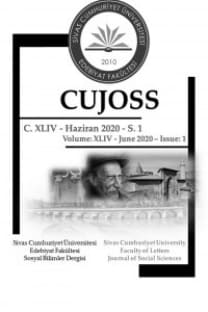Rousseau'nun "Yalnız Gezenin Düşleri"nde Mutluluk Arayışı
“Aykırı” görüş ve düşünceleri ile tepkileri üzerine çekmiş olan Rousseau, çağdaşlarınca anlaşılmamış, toplum içinde mutlu olamamış ve bu nedenle de yalnızlığı seçmiştir. Son yapıtı olan Yalnız Gezenin Düşleri'nde, kendini mutsuz eden toplumdan kaçarak doğada yalnızlığına sığınan Rousseau, mutluluğu kendinde bulduğunu söylemiştir. Bu çalışma, son yapıtındaki mutluluk arayışını sergilemeyi amaçlamaktadır. Mutluluk arayışı, hiç kuşkusuz bir mutluluk gereksiniminin ortaya çıkışıyla başlamaktadır. Rousseaucu mutluluk ahlâkının dinamikleri de bu mutluluğun çerçevesini çizmektedir. Mutluluk arayışına mutsuzluk deneyiminden yola çıkarak başlayan Rousseau'nun doğada, “özgür, tek başına” yaptığı gezintiler sırasında ve düşleri aracılığı ile tattığı mutluluk bir “ben” mutluluğudur. Zira o, kendine yeterlik içinde, kendi varlığından beslenip, kendi varlığından tat almaktadır. Ama bu “ben” mutluluğu “bencil” bir mutluluk değildir.“Öteki”nin sorumluluğunu da yüklenmeye çağıran bir dinamik içerir aslında. “Ben” esinli, “ben” odaklı, “ben”i yücelten bu mutluluk atılımı ile Romantizm'in öncüsü olarak taçlanan Rousseau, bir yandan akıl-duygu karşıtlığını yenebilmiş, diğer yandan da “öteki”ne giden yolun “ben”den geçtiğini göstererek, bir anlamda, ben-öteki karşıtlığını aşmayı başarmıştır.
The Search of Happiness in "The Reveries of The Solitary Walker" of Rousseau
Rousseau, because of his “antithetic” perspectives and thoughts, collided with his age, was not understood by his contemporaries, could not achieve the mood of blissfulness within the society he was situated, hence, he desired solitude. In his ultimate opus “The Reveries of the Solitary Walker”, Rousseau, who evaded from the society that had posed him a great deal of misery and took sanctuary in his solitude in nature, declared that he had found happiness in himself. This work is designated for the particular purpose of unraveling and unfolding the search of happiness in this latest work that was created through the ending period of his life. His experience considering unhappiness, thus, also has a paramount role to play in his search of happiness. The happiness, Rousseau experienced, which was derived from the “free, solitary” promenades into the nature, and which was obtained through the reveries in which he lost himself during these trips, is a happiness of “me”. Because, he, in a self-sufficiency, nourished on his own existence, perceived this very same source; that is, his own existence. The happiness of “me”, however, is not identified as a “selfish” happiness. In fact, happiness of “me” has in its mould a dynamic calling for the commitment of the responsibility of the “other”. Rousseau, who was crowned as the pioneer of Romanticism with this progress of happiness inspired by “me”, focalizing on “me”, sublimating “me”, not only overwhelmed the polarity of feeling and reason, but also achieved in the journey beyond the contrariness of the “other” by demonstrating that the way toward the “other” passes through “me”.
___
- AKARSU, Bedia. (1982), Ahlâk Öğretileri, İstanbul: Remzi Kitapevi.
- BACHELARD, Gaston. (1943), L'Air er Les Songes, Paris: Librairie José Corti.
- BACHELARD, Gaston. (1948), La Tere et Les Rêveries du Repos, Paris: Librairie José Corti.
- BOCHET, Marc. (1997a), Les Rêveries du Promoneur Solitaire de Rousseau, Paris: Hachette.
- BOCHET, Marc. (1997b), Les Confessions de Rousseau, Paris: Hachette.
- CEBECİ, Oğuz. (2004), Psikanalitik Edebiyat Kuramı, İstanbul: İthaki Yayınları.
- DAVY, Marie-M. (1966), La Connaissance de Soi, Paris: Presses Universitaire de France
- DELEUZE, Gilles. (2004), Proust ve Göstergeler, İstanbul: Kabalcı Yayınları.
- DENT, N.J.H. (1991), Rousseau Sözlüğü, (Çev: B. Gözkan, N. Ilgacıoğlu, A. Çitil, A. Kovanlıkaya), Ankara: Sarmal Yayıncılık.
- GÖKBERK, Macit. (1985), Felsefe Tarihi, İstanbul: Remzi Kitabevi.
- GRENIER, Jean. (1972), Introduction de Les Rêveries du Promoneur Solitaire de Jean-Jacques Rousseau, Paris: Editions Gallimard.
- GÜNYOL, Vedat (1979), Ünlü Kişiler; Jean-Jacques Rousseau, İstanbul: Evrim Matbaacılık.
- NEMUTLU, Duran (1985), La Technique de Persuasion dans l'Emile de Jean-Jacques Rousseau, Yayınlanmamış Doktora Tezi, Sivas.
- POWYS, John.C. (1984), Une Philosophie de la Solitude, Paris: Editions de al Différence.
- RAYMOND, Marcel. (1986), La Quête de Soi et La Rêverie, Paris: Librairie José Corti.
- ROUSSEAU, Jean-Jacques. (1956), Emile Yahut Terbiyeye Dair, (Çev: Hilmi Ziya Ülken, Ali Rıza Ülgener, Selâhattin Güzey) İstanbul: Türkiye Yayınevi.
- ROUSSEAU, Jean-Jacques. (1975), İtiraflar, (Çev: Kenan Somer) İstanbul: Remzi Kitapevi.
- ROUSSEAU, Jean-Jacques. (1982), İnsanlar Arasındaki Eşitsizliğin Kaynağı, (Çev: Rasih Nuri İleri) İstanbul: Say Yayınları
- ROUSSEAU, Jean-Jacques. (1984), Toplum Sözleşmesi, (Çev: Vedat Günyol) İstanbul: Adam Yayıncılık.
- ROUSSEAU, Jean-Jacques. (2004), Yalnız Gezerin Düşleri, (Çev: Ester Yanarocak) İstanbul. Bordo-Kırmızı Yayınları.
- ROUSSEAU, Jean-Jacques. (2007), Bilimler ve Sanatlar Üstüne Söylev, (Çev: Sabahattin Eyüboğlu) İstanbul. Türkiye İş Bankası Kültür Yayınları.
- RUSSELL, Bertrand. (1963), Saadet Yolu, (Çev: Nurettin Özyürek) İstanbul: Varlık Yayınları.
- STAROBINSKI, Jean. (1992), L’OEil Vivant, Paris: Gallimard.
- STRAUSS, Leo. (1984), L’Intention de Rousseau, Pensée de Rousseau, (Editeurs: Gérard Genette et Tzevetan Todorov) Paris: Editions de Seuil.
- SUNAT, Halûk. (2004), Postmodernizm Dost mu Düşman mı?, Varlık Dergisi, Ağustos 2004,s.21,İstanbul.
- VOISINE, Jacques. (1998), Yalnız Gezerin Düşleri İçin Önsöz, (Çev: Hasan Fehmi Nemli), Ankara: Öteki Yayınları.
- WOLKER, Robert. (2003), Rousseau, (Çev: Cemal Atila) İstanbul: Altın Kitaplar.
- ISSN: 1305-5143
- Yayın Aralığı: Yılda 2 Sayı
- Yayıncı: Sivas Cumhuriyet Üniversitesi Edebiyat Fakültesi
Sayıdaki Diğer Makaleler
Rousseau'nun "Yalnız Gezenin Düşleri"nde Mutluluk Arayışı
Atatürk Döneminin Dil Kültür Ve Edebiyat Politikalarını Yansıtan Bir Halkevi Dergisi: Ortayayla
“Program Geliştirme” Kavramına İlişkin Metaforlarla Yeni İlköğretim Programlarına Farklı Bir Bakış
Yüklemin Özne ve Nesne İlişkisi
